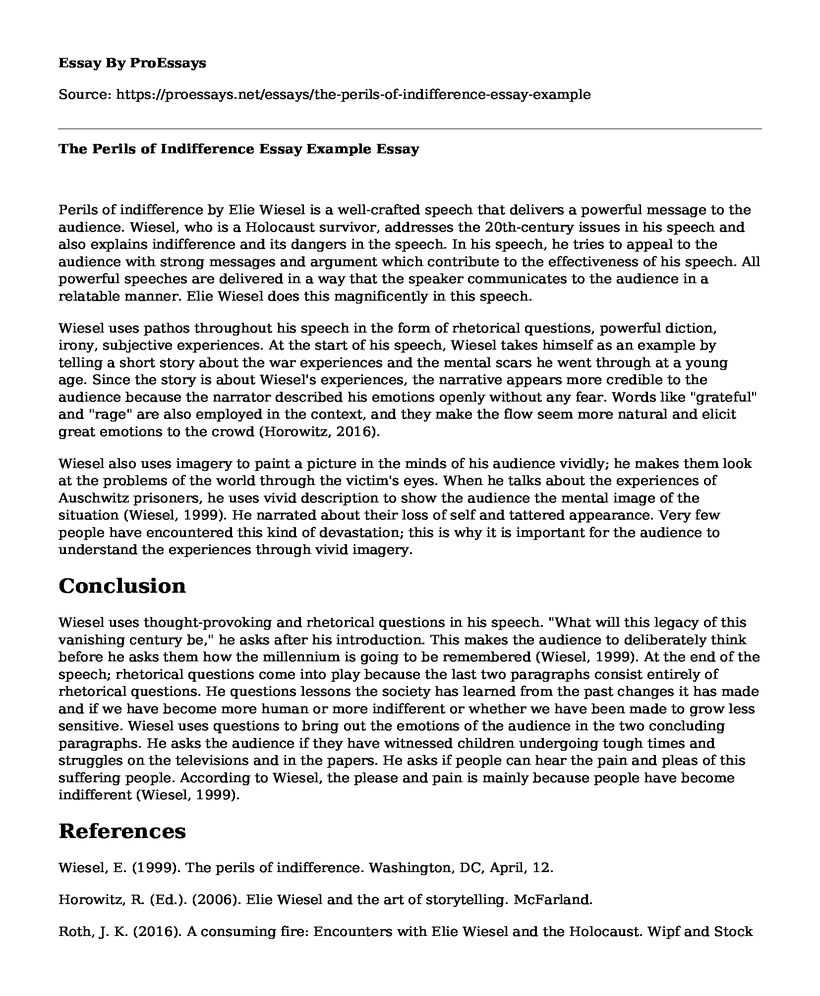Perils of indifference by Elie Wiesel is a well-crafted speech that delivers a powerful message to the audience. Wiesel, who is a Holocaust survivor, addresses the 20th-century issues in his speech and also explains indifference and its dangers in the speech. In his speech, he tries to appeal to the audience with strong messages and argument which contribute to the effectiveness of his speech. All powerful speeches are delivered in a way that the speaker communicates to the audience in a relatable manner. Elie Wiesel does this magnificently in this speech.
Wiesel uses pathos throughout his speech in the form of rhetorical questions, powerful diction, irony, subjective experiences. At the start of his speech, Wiesel takes himself as an example by telling a short story about the war experiences and the mental scars he went through at a young age. Since the story is about Wiesel's experiences, the narrative appears more credible to the audience because the narrator described his emotions openly without any fear. Words like "grateful" and "rage" are also employed in the context, and they make the flow seem more natural and elicit great emotions to the crowd (Horowitz, 2016).
Wiesel also uses imagery to paint a picture in the minds of his audience vividly; he makes them look at the problems of the world through the victim's eyes. When he talks about the experiences of Auschwitz prisoners, he uses vivid description to show the audience the mental image of the situation (Wiesel, 1999). He narrated about their loss of self and tattered appearance. Very few people have encountered this kind of devastation; this is why it is important for the audience to understand the experiences through vivid imagery.
Conclusion
Wiesel uses thought-provoking and rhetorical questions in his speech. "What will this legacy of this vanishing century be," he asks after his introduction. This makes the audience to deliberately think before he asks them how the millennium is going to be remembered (Wiesel, 1999). At the end of the speech; rhetorical questions come into play because the last two paragraphs consist entirely of rhetorical questions. He questions lessons the society has learned from the past changes it has made and if we have become more human or more indifferent or whether we have been made to grow less sensitive. Wiesel uses questions to bring out the emotions of the audience in the two concluding paragraphs. He asks the audience if they have witnessed children undergoing tough times and struggles on the televisions and in the papers. He asks if people can hear the pain and pleas of this suffering people. According to Wiesel, the please and pain is mainly because people have become indifferent (Wiesel, 1999).
References
Wiesel, E. (1999). The perils of indifference. Washington, DC, April, 12.
Horowitz, R. (Ed.). (2006). Elie Wiesel and the art of storytelling. McFarland.
Roth, J. K. (2016). A consuming fire: Encounters with Elie Wiesel and the Holocaust. Wipf and Stock Publishers.
Cite this page
The Perils of Indifference Essay Example. (2022, Oct 10). Retrieved from https://proessays.net/essays/the-perils-of-indifference-essay-example
If you are the original author of this essay and no longer wish to have it published on the ProEssays website, please click below to request its removal:
- Persuasive Research Essay on War Is Kind by Stephen Crane
- Research Paper Example on Role of Women Before Civil War
- The Thirty Years' War: Europe's Brutal Religious Conflict - Essay Sample
- Essay Example on Renaissance Era: Music & Universe Changes (1450-1600)
- Essay on Zombies: Reawakened Corpses, Horror Movies, & The Girl with All Gifts
- Research Paper on Transmedia Storytelling: New Way of Communicating in the 21st Century
- Kuwait-Iraq War: Looms of Conflict After Iraq-Iran War - Essay Sample







